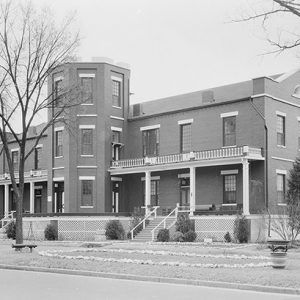calsfoundation@cals.org
Seizure of the Little Rock Arsenal
The seizure of the Little Rock Arsenal was an event during the secession crisis of 1861. The people of Arkansas were contemplating leaving the Union, and armed volunteer companies from around the state took control of the Federal arsenal from soldiers of the U.S. Army.
The crisis began in November 1860, when Abraham Lincoln was elected president of the United States. In response to the prodding of Governor Henry Rector, the Arkansas House of Representatives passed a bill on December 22, calling for voters to decide if a state secession convention should be held and, if so, select delegates to attend. The state Senate passed the bill on January 15, 1861, and the election was set for February 18.
During this time of heated debates, the previously unmanned Little Rock Arsenal was garrisoned in November 1860 by sixty-five Federal troops under the command of Captain James Totten, the son of William Totten, who was a physician in Little Rock (Pulaski County). Pro-secessionists in Helena (Phillips County) urged Rector to seize the arsenal and the weapons it held before more Federal troops could arrive from the Indian Territory. Rumors of approaching Federal troops swept through the southeastern counties of the state. An offer for volunteers to take the arsenal was turned down by the adjutant-general of the Arkansas militia, but he did imply that groups that organized for the task would receive the blessing of the governor.
On January 28, Rector informed Totten that neither reinforcements nor the removal or destruction of weapons at the arsenal would be permitted. Totten replied that he took his orders from the federal government and not the state of Arkansas. At the same time, the first volunteers from the state began to appear in the city to help seize the arsenal. Rumors about the potential reinforcement of the garrison swept through the city, although they always proved to be untrue. In early February, the steamer S. H. Tucker was reportedly approaching the city with a number of Federal troops on board. The volunteers already in the capital were posted at the water’s edge and were supported by cannon supplied by the governor. But no troops ever appeared.
By February 5, groups of volunteers from Phillips, Jefferson, Prairie, White, Monroe, Hot Spring, Saline, Montgomery, and St. Francis counties had arrived in Little Rock. The next day, the city council demanded that Rector use his authority to stop any attack on the arsenal. Rector continued to claim that he had no authority over the volunteers. The Little Rock militia, including the Capital Guards, was called out to keep order between the Unionists and secessionists in the city.
On February 6, the governor wrote to Totten and explained that, while he was not in command of the volunteers, he did ask for the garrison to surrender to prevent possible bloodshed. Totten, who had not received any instructions from his commanders, agreed to the surrender and turned the entire arsenal over to the Capital Guards. On February 8, the militia unit escorted the Federal troops out of the arsenal and to the Arkansas River, where they boarded a steamer bound for St. Louis, Missouri, on February 12. As they waited, Totten was presented with a sword by the ladies of Little Rock in recognition of his honorable behavior and for preventing bloodshed in their city.
The vote for the secession convention was passed by the voters of the state later in February, but Arkansas would not leave the Union until May during a second session of the convention. The weapons held in the arsenal were later distributed to Arkansas and Confederate units.
For additional information:
Christ, Mark. ed. Rugged and Sublime: The Civil War in Arkansas. Fayetteville: University of Arkansas Press, 1994.
Dougan, Michael B. Confederate Arkansas: The People and Policies of a Frontier State in Wartime. Tuscaloosa: University of Alabama Press, 1976, 1990.
Moneyhon, Carl. The Impact of the Civil War and Reconstruction on Arkansas: Persistence in the Midst of Ruin. Baton Rouge: Louisiana State University Press, 1994.
Sesser, David. The Little Rock Arsenal Crisis: On the Precipice of the American Civil War. Charleston, SC: The History Press, 2013.
———. “‘Should the People Assemble in Their Own Defense?’ Militia and Volunteer Units in the Little Rock Arsenal Crisis.” Arkansas Military History Journal 16 (Winter 2022): 1–28.
David Sesser
Henderson State University
 Civil War Timeline
Civil War Timeline Military
Military Napoleon, Seizure of Ordnance Stores at
Napoleon, Seizure of Ordnance Stores at Pulaski Light Artillery Battery (CS)
Pulaski Light Artillery Battery (CS) ACWSC Logo
ACWSC Logo  Henry Rector
Henry Rector  Tower Building
Tower Building 



Comments
No comments on this entry yet.